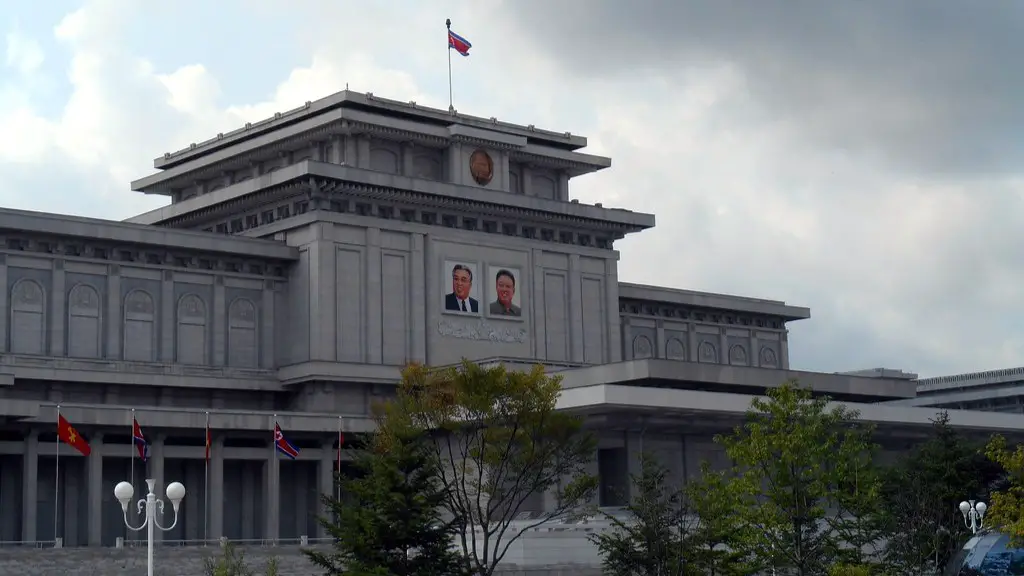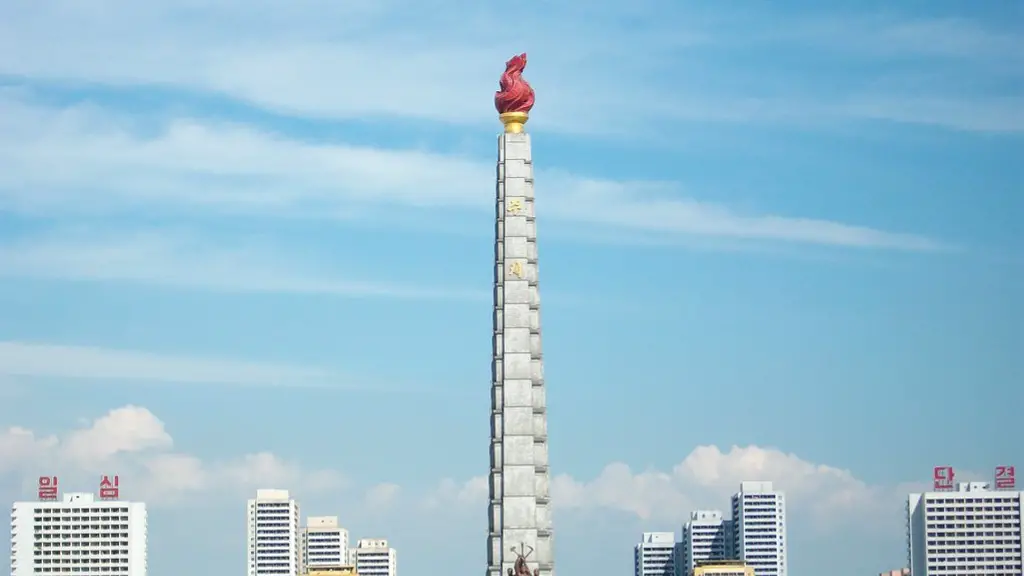Tensions between North and South Korea remain high, despite the remarkable progress made in inter-Korean relations over the past two decades. To truly understand the differences between North and South Korea, one must consider the history of war and politics that has shaped the two countries and the result of modern-day development.
North Korea and South Korea have been divided since the Korean War came to a ceasefire in 1953. During the war, North Korea was backed by China and the Soviet Union, while South Korea was supported by the United States and United Nations forces. While a formal peace treaty was never signed, the armistice has remained in place, and the two countries have since fallen under different governing ideologies.
North Korea is a communist-run one-party state, and its leader, Kim Jong-Un, is held in the highest regard. The government is highly autocratic, and the people of North Korea are governed by an elaborate system of surveillance and control. North Korean citizens are cut off from the rest of the world, with almost all information coming from state-run media. North Korea’s economy is largely isolated, with little foreign investment and no significant trade in comparison to South Korea.
South Korea, on the other hand, is a vibrant democracy that has been led by a number of different Presidents since its formal independence from North Korea in 1948. Its economy is the world’s 11th largest, and is driven by a vibrant private sector that is driven by world-class technology, industry, and finance. South Korea is a leader of the global economy, with millions of residents living and working abroad and millions receiving foreign investment every year. In comparison to North Korea, South Korea is much more connected to the world and has far less restrictions on freedoms of speech and movement.
Politically, North and South Korea have very different stances. South Korea is a strong ally of the United States, while North Korea has traditionally been an adversary. In recent years, there have been efforts to improve relations between the two countries, with a historic summit between the leaders of both sides making big headlines in 2018. However, tensions remain high as North Korea continues to build its nuclear weapons program, and South Korea remains firmly committed to its alliance with the United States.
Socially, North and South Korea are also very different. South Korea is a rapidly urbanizing nation, with modern cities and a well-educated population. North Korea, on the other hand, remains largely rural, with most of the population living in poverty. There is also a stark difference in access to information and communications between North and South Korea, as North Korean citizens are heavily censored from accessing the internet and the international media.
Overall, the differences between North and South Korea are vast. From their contrasting political systems, to their economic and social disparities, these two countries have been divided for over half a century and the divide is expected to remain for years to come.
Economics
Socially, North and South Korea are also very different when it comes to their economies. South Korea is one of the world’s most successful economies, having achieved rapid growth rates and low levels of poverty over the past several decades. The South Korean economy has become heavily dependent on exports, while its currency, the Won, is one of the strongest in East Asia. North Korea’s economic situation, however, remains relatively weak. The country is under stringent economic sanctions, and its citizens face severe food shortages, leading to malnutrition and poverty. Additionally, due to its autocratic political system, North Korea is seized with corruption, which has hindered its economic development.
Foreign investment also plays a crucial role in the economic disparities between North and South Korea. South Korea is supported by rich foreign direct investment, while North Korea has had little economic support from external entities, making access to resources, technology, and capital difficult for North Korean citizens. Unsurprisingly, income levels remain much higher in South Korea, during a time when North Korea faces extreme poverty.
Military
The two countries also differ greatly when it comes to their military capabilities. North Korea has an estimated 1.2 million active military personnel, making it the fourth largest military in the world. It is also estimated to have a stockpile of nuclear warheads and one of the world’s most powerful militaries. South Korea, on the other hand, has an active military of just under 500,000 personnel, making it the 15th largest military in the world. South Korea is supported by the 28,500 military personnel stationed in the country by the United States.
The military disparity between North and South Korea is further highlighted by the amount each country spends on their military. North Korea is one of the world’s top military spenders, reportedly spending 22% of its national budget on military capabilities and equipment. South Korea, however, is a much less aggressive spender, devoting 10% of its budget to military spending. South Korea instead focuses on building its technological capabilities, such as its strong air and naval forces.
Culture
The two Koreas also differ significantly in terms of their culture, language, and identity. South Korea is a highly globalized, westernized nation with a rich cultural legacy, while North Korea embraces an isolationist, traditionalist identity. North Koreans also speak Korean differently from their Southern neighbors and adhere to different cultural norms. South Koreans are renowned for their hospitality and are renowned for their food, fashion, and beauty culture.
South Korean pop culture has also been embraced by other countries, becoming one of the most popular entertainment sources of the modern era. South Korea’s popular culture often features themes of traditionalism, while North Korea’s approach tended to be much more conservative and did not share the same level of global popularity. The two Koreas also have different approaches to their national holidays and festivals, embracing both traditional and modern customs.
Politics
Politically, North and South Korea have been divided since 1948, and these differences have only grown since then. South Korea is a vibrant democracy, while North Korea is a one-party state that generally restricts its citizens from democratic participation. South Korea is a strong ally of the United States, while North Korea has traditionally been an adversary. The two countries also take different stances when it comes to the issue of reunification, with South Korea prioritizing the unification of the peninsula.
The two sides have engaged in talks and negotiations in the past, most notably during the Kim Jong-Un/Moon Jae-in summit in 2018. North Korea’s more recent forays into diplomacy and international engagement, however, have been met with skepticism and caution from the international community, and it remains to be seen if the two sides can agree on a peaceful resolution to their long and complex history.
International Relations
North and South Korea also have vastly different stances when it comes to international relations. South Korea is a key ally of the United States and is a member of the United Nations, while North Korea remains largely isolated and is not a member of any major world body. North Korea has, however, sought to engage diplomatically in recent years, including with South Korea and China. To this effect, North Korea’s new leader Kim Jong-Un has been actively engaged in diplomatic endeavors, much to the surprise of the world.
South Korea is also a growing leader in Asia. South Korea has had a much more amicable relationship with its neighbors, such as China and Japan, with the two sides engaging in trade and diplomatic relations. South Korea’s close relationship with the United States has eased much of the tension in East Asia, while North Korea remains under increased scrutiny from the international community.
Overall, the differences between North and South Korea are vast, and the divide is expected to remain in place for the foreseeable future. While there has been some progress towards unification, much of the potential for interaction between the two sides is stymied by the vastly different philosophies and approaches taken by the two countries.




